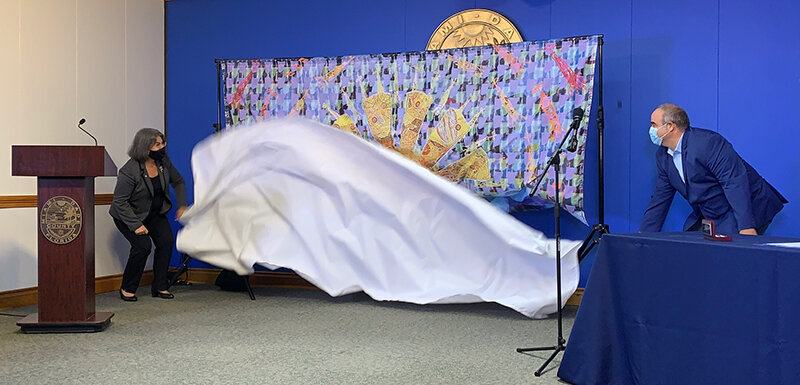
Miami-Dade, FL
HR&A adapted the Talking Transition model to execute “Thrive305,” the largest public engagement initiative in Miami-Dade County government history. Implemented at the height of COVID 19, the initiative implemented adaptive digital surveying, targeted community canvassing, community engagement events that blended virtual and in-person participation, and a strategic planning methodology rooted in radical inclusion and systemic change.

Challenge
It has been said before that greater Miami is ‘a place of constant change without a solid blueprint’—a place with a history of inconsistent civic engagement and a fragmented political structure unresponsive to its most existential challenges.
Thrive305 leveraged the historic election of Miami-Dade Mayor Daniella Levine Cava and the start of her new administration to advance a model of local government that works to bring people together around a unified vision for action. The goal was to work closely with the Mayor’s Office of Innovation and Performance to implement Thrive305 in a way that it can create a sustainable transformation of internal government practices around engagement, community partnership, and collaborative policy development and implementation. The process was designed to create opportunities for residents and County staff at all levels to directly shape the priorities of the Levine Cava administration and to impact how County staff sustain a new era of civic engagement in Miami-Dade County.
Response
HR&A led the program design and engagement process for Thrive305 to maximize the potential for long-term transformation in the ways that Miami-Dade government works. The process began with HR&A working closely with the newly-installed mayor and senior County officials to determine how the outcomes of the process could be institutionalized within the budget and strategic planning systems of County government.
In February 2021, Thrive305 launched a countywide survey in collaboration with County departments and civic partner organizations to better understand resident needs, concerns, and the types of solutions to these challenges with the widest support from County residents. In addition to outreach online and over the phone from civic partner organizations, community data partners canvassed neighborhoods to drive participation from underrepresented geographies and reach residents without access to the internet. During the three-week survey period, nearly 26,500 people submitted valid responses in English, Spanish, and Haitian Creole, providing over 1.2 million question responses.
Thrive305 put County employees at the center of transforming how the County engages communities, as HR&A trained and onboarded over 250 County employees to actively participate in the initiative as Thrive305 Ambassadors. Ambassadors facilitated resident town hall discussions as part of “Civic Week”, a full-week of community conversations and engagement opportunities to inspire solution-oriented collaboration between Miami-Dade residents and their County government. The program incorporated the Thrive305 survey results, nightly community conversations, expert panels and presentations, and a collaborative art piece. During Civic Week, 500+ residents from across Miami-Dade joined in conversation.
The results of these public discussions informed the execution of the Action Plan Workshops, which brought together the region’s top policy experts and County leaders to discuss community insights and policy priorities surfaced during Civic Week and to craft bold, practical, implementable solutions and recommendations for the Thrive305 Action Plan.
HR&A, in partnership with County leaders, is drafting a final Thrive305 Action Plan that translates twelve resident priorities that emerged from this process into specific government actions that are assigned to departments across County government.
Impact
Thrive305 is the beginning of a new era of civic engagement in Miami-Dade County. The initiative has created the potential to advance a community-driven plan of action that can transform how Miami-Dade government works in the long-term.
In the short-term, the administration is in the final stages of negotiating the FY21-22 budget, which includes budget items directly linked to Thrive305 priorities and actions. Recent budget hearings have included Thrive305 participants, community partners, constituents, and small businesses supporting the Mayor’s budget. The administration is also taking steps to update the Strategic Plan and incorporating into the updated plan a new set of objectives and metrics informed by Thrive305. That will facilitate how County agencies adopt Thrive305 actions in their yearly business plans, budgeting process, and performance measurement systems. Along with this effort, the administration is in the process of forming a council of executive leaders within County government to support the implementation of Thrive305 actions that require coordinating multiple agencies, municipalities, and levels governments.
Going forward, the administration has committed to establishing regular Thrive305 convenings to create new opportunities for partnership, to report back on progress and impact, and to identify new actions to include in the Thrive305 Action Plan—which will live on as a ‘living document’ reflective of real-time consensus by residents on the most urgent challenges they face.
Partners
Thrive305 is a partnership between Miami-Dade County Mayor Daniella Levine Cava, The Miami Foundation (TMF), and a coalition of philanthropic organizations that have provided financial support, including:
The Ford Foundation
Knight Foundation
Allegany Franciscan Ministries
The Health Foundation of South Florida
Milton Family Foundation
Shepard Broad Foundation
This unprecedented effort could not have been possible without the deep, thoughtful contributions of over 50 civic organizations who helped shape every stage of the Thrive305 process, made sure that their constituencies were engaged and heard, and who helped define the actions included in this plan. The civic partners were invited to guide development of the Thrive305 process in partnership with senior leaders in County government, so that the process is both externally accountable and builds knowledge for external groups and residents at large of the County’s powers and systems for strategic planning and policy development.
The Conversation
Miami-Dade residents can join Thrive305 forums this week [Miami Herald]




